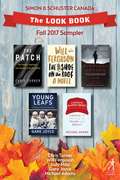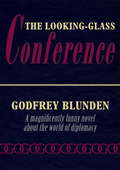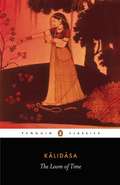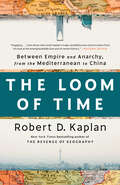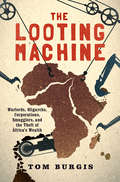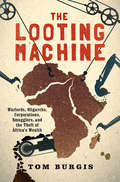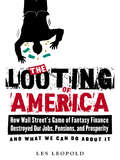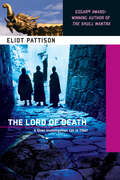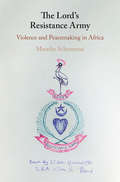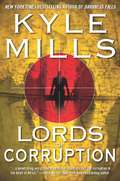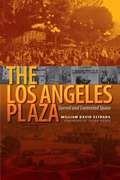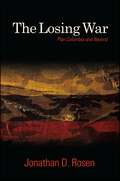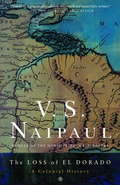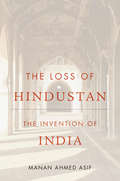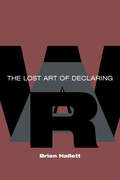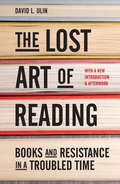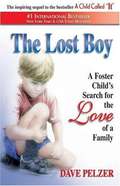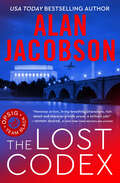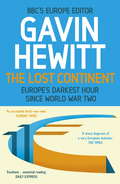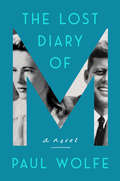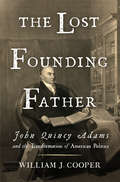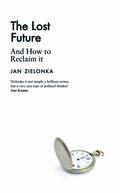- Table View
- List View
The Look Book: Fall 2017 Sampler
by Chris Turner Michael Adams Will Ferguson Gare Joyce Jody MiticThe Look Book offers a sample of groundbreaking and exciting new books on the Fall 2017 Simon & Schuster Canada list. <P><P>Dip into the latest masterwork from the winner of Canada’s top fiction prize. Hear stories from Canada’s courageous veterans. Consider the future of our country with an investigation into the oil sands and a look at the risks Canadians face in the wake of Brexit and Donald Trump. And because it’s not Fall in Canada without talking hockey, curl up with a book about our country’s most notable sports team. <P><P>With chapter excerpts from the following Fall 2017 new releases: The Shoe on the Roof, by Will Ferguson Everyday Heroes: Inspirational Stories from Men and Women in the Canadian Armed Forces, by Jody Mitic The Patch: The People, Pipelines, and Politics of the Oil Sands, by Chris Turner Could It Happen Here? Canada in the Age of Trump and Brexit, by Michael Adams Young Leafs: The Making of a New Hockey History, by Gare Joyce Look back, look around, and look forward. <P><P>Happy Reading! The Team at Simon & Schuster Canada If you would like to learn more about any of our authors or the titles featured, please visit us at SimonandSchuster.ca, follow us on Twitter at @SimonSchusterCA, or like us at Facebook.com/SimonandSchusterCanada.
The Looking-Glass Conference
by Godfrey BlundenA brilliantly funny satire on modern diplomacy.The Far Eastern republic of Inevitable Khaos is at war with the repulic of Incredible Khaos and an international conference is gathering in a neutral European capital to discuss the problem. First on the scene come the security authorities wrangling about accommodation for their delegations. Two Russian painters may be spies, refugees seeking political asylum or the advance guard of the Russian delegation. And a young Khaotian patriot decides to live in a tree outside the conference building until peace comes to his country.Next arrive the delegates themselves: they discuss procedure, protocol and the official language. But the main pre-occupation of each is to utter the precise cliche that will fire the world's imagination and immortalize his attendance at the conference.The Looking-Glass Conference is a brilliant political satire. It is uproariously funny, but Mr Blunden's host of characters are endearingly human and their varied national characteristics are unmistakably true to life.
The Looking-Glass Conference
by Godfrey BlundenA brilliantly funny satire on modern diplomacy.The Far Eastern republic of Inevitable Khaos is at war with the repulic of Incredible Khaos and an international conference is gathering in a neutral European capital to discuss the problem. First on the scene come the security authorities wrangling about accommodation for their delegations. Two Russian painters may be spies, refugees seeking political asylum or the advance guard of the Russian delegation. And a young Khaotian patriot decides to live in a tree outside the conference building until peace comes to his country.Next arrive the delegates themselves: they discuss procedure, protocol and the official language. But the main pre-occupation of each is to utter the precise cliche that will fire the world's imagination and immortalize his attendance at the conference.The Looking-Glass Conference is a brilliant political satire. It is uproariously funny, but Mr Blunden's host of characters are endearingly human and their varied national characteristics are unmistakably true to life.
The Loom of Time: A Selection of His Plays and Poems
by Chandra Rajan Kalidasa KâlidâsaKalidasa is the major poet and dramatist of classical Sanskrit literature - a many-sided talent of extraordinary scope and exquisite language. His great poem, Meghadutam (The Cloud Messenger), tells of a divine being, punished for failing in his sacred duties with a years' separation from his beloved. A work of subtle emotional nuances, it is a haunting depiction of longing and separation. The play Sakuntala describes the troubled love between a Lady of Nature and King Duhsanta. This beautiful blend of romance and comedy, transports its audience into an enchanted world in which mortals mingle with gods. And Kalidasa's poem Rtusamharam (The Gathering of the Seasons) is an exuberant observation of the sheer variety of the natural world, as it teems with the energies of the great god Siva.
The Loom of Time: Between Empire and Anarchy, from the Mediterranean to China
by Robert D. KaplanA stunning exploration of the Greater Middle East, where lasting stability has often seemed just out of reach but may hold the key to the shifting world order of the twenty-first century&“Engaging . . . Even those who resist Kaplan&’s tragic sensibility have much to learn from his look at the emerging Middle East and its recent history.&”—National Review The Greater Middle East, which Robert D. Kaplan defines as the vast region between the Mediterranean and China, encompassing much of the Arab world, parts of northern Africa, and Asia, existed for millennia as the crossroads of empire: Macedonian, Roman, Persian, Mongol, Ottoman, British, Soviet, American. But with the dissolution of empires in the twentieth century, postcolonial states have endeavored to maintain stability in the face of power struggles between factions, leadership vacuums, and the arbitrary borders drawn by exiting imperial rulers with little regard for geography or political groups on the ground. In the Loom of Time, Kaplan explores this broad, fraught space through reporting and travel writing to reveal deeper truths about the impacts of history on the present and how the requirements of stability over anarchy are often in conflict with the ideals of democratic governance. In The Loom of Time, Kaplan makes the case for realism as an approach to the Greater Middle East. Just as Western attempts at democracy promotion across the Middle East have failed, a new form of economic imperialism is emerging today as China's ambitions fall squarely within the region as the key link between Europe and East Asia. As in the past, the Greater Middle East will be a register of future great power struggles across the globe. And like in the past, thousands of years of imperial rule will continue to cast a long shadow on politics as it is practiced today. To piece together the history of this remarkable place and what it suggests for the future, Kaplan weaves together classic texts, immersive travel writing, and a great variety of voices from every country that all compel the reader to look closely at the realities on the ground and to prioritize these facts over ideals on paper. The Loom of Time is a challenging, clear-eyed book that promises to reframe our vision of the global twenty-first century.
The Looting Machine
by Tom BurgisThe trade in oil, gas, gems, metals and rare earth minerals wreaks havoc in Africa. During the years when Brazil, India, China and the other "emerging markets” have transformed their economies, Africa’s resource states remained tethered to the bottom of the industrial supply chain. While Africa accounts for about 30 per cent of the world’s reserves of hydrocarbons and minerals and 14 per cent of the world’s population, its share of global manufacturing stood in 2011 exactly where it stood in 2000: at 1 percent. In his first book, The Looting Machine, Tom Burgis exposes the truth about the truth about the African development miracle: for the resource states, it's a mirage. The oil, copper, diamonds, gold and coltran deposits just attract a global network of traders, bankers, corporate extractors and investors who combine with venal political cabals to loot the states' value . And the vagaries of resource-dependent economies could pitch Africa’s new middle class back into destitution just as quickly as they climbed out of it. The ground beneath their feet is as precarious as a Congolese mine shaft; their prosperity could spill away like crude from a busted pipeline. This catastrophic social disintegration is not merely a continuation of Africa’s past as a colonial victim. The looting now is accelerating as never before. As global demand for Africa’s resources rises, a handful of Africans are becoming legitimately rich but the vast majority, like the continent as a whole, are being fleeced. Outsiders tend to think of Africa as a great drain of philanthropy. But look more closely at the resource industry and the relationship between Africa and the rest of the world looks rather different. In 2010, fuel and mineral exports from Africa were worth $333 billion, more than seven times the value of the aid that went in the opposite direction. But who received the money? For every Frenchwoman who dies in childbirth, 100 die in Niger alone, the former French colony whose uranium fuels France’s nuclear reactors. In petro-states like Angola three-quarters of government revenue comes from oil. The government is not funded by the people, and as result it is not beholden to them. A score of African countries whose economies depend on resources are rentier states; their people are largely serfs. The resource curse is not merely some unfortunate economic phenomenon, the product of an intangible force. What is happening in Africa’s resource states is systematic looting. Like its victims, its beneficiaries have names.
The Looting Machine
by Tom BurgisThe trade in oil, gas, gems, metals and rare earth minerals wreaks havoc in Africa. During the years when Brazil, India, China and the other "emerging markets” have transformed their economies, Africa’s resource states remained tethered to the bottom of the industrial supply chain. While Africa accounts for about 30 per cent of the world’s reserves of hydrocarbons and minerals and 14 per cent of the world’s population, its share of global manufacturing stood in 2011 exactly where it stood in 2000: at 1 percent. In his first book, The Looting Machine, Tom Burgis exposes the truth about the truth about the African development miracle: for the resource states, it's a mirage. The oil, copper, diamonds, gold and coltran deposits just attract a global network of traders, bankers, corporate extractors and investors who combine with venal political cabals to loot the states' value . And the vagaries of resource-dependent economies could pitch Africa’s new middle class back into destitution just as quickly as they climbed out of it. The ground beneath their feet is as precarious as a Congolese mine shaft; their prosperity could spill away like crude from a busted pipeline. This catastrophic social disintegration is not merely a continuation of Africa’s past as a colonial victim. The looting now is accelerating as never before. As global demand for Africa’s resources rises, a handful of Africans are becoming legitimately rich but the vast majority, like the continent as a whole, are being fleeced. Outsiders tend to think of Africa as a great drain of philanthropy. But look more closely at the resource industry and the relationship between Africa and the rest of the world looks rather different. In 2010, fuel and mineral exports from Africa were worth $333 billion, more than seven times the value of the aid that went in the opposite direction. But who received the money? For every Frenchwoman who dies in childbirth, 100 die in Niger alone, the former French colony whose uranium fuels France’s nuclear reactors. In petro-states like Angola three-quarters of government revenue comes from oil. The government is not funded by the people, and as result it is not beholden to them. A score of African countries whose economies depend on resources are rentier states; their people are largely serfs. The resource curse is not merely some unfortunate economic phenomenon, the product of an intangible force. What is happening in Africa’s resource states is systematic looting. Like its victims, its beneficiaries have names.
The Looting Machine: Warlords, Oligarchs, Corporations, Smugglers, and the Theft of Africa's Wealth
by Tom BurgisThe trade in oil, gas, gems, metals and rare earth minerals wreaks havoc in Africa. During the years when Brazil, India, China and the other "emerging markets” have transformed their economies, Africa’s resource states remained tethered to the bottom of the industrial supply chain. While Africa accounts for about 30 per cent of the world’s reserves of hydrocarbons and minerals and 14 per cent of the world’s population, its share of global manufacturing stood in 2011 exactly where it stood in 2000: at 1 percent. In his first book, The Looting Machine, Tom Burgis exposes the truth about the African development miracle: for the resource states, it's a mirage. The oil, copper, diamonds, gold and coltan deposits attract a global network of traders, bankers, corporate extractors and investors who combine with venal political cabals to loot the states' value. And the vagaries of resource-dependent economies could pitch Africa’s new middle class back into destitution just as quickly as they climbed out of it. The ground beneath their feet is as precarious as a Congolese mine shaft; their prosperity could spill away like crude from a busted pipeline. This catastrophic social disintegration is not merely a continuation of Africa’s past as a colonial victim. The looting now is accelerating as never before. As global demand for Africa’s resources rises, a handful of Africans are becoming legitimately rich but the vast majority, like the continent as a whole, is being fleeced. Outsiders tend to think of Africa as a great drain of philanthropy. But look more closely at the resource industry and the relationship between Africa and the rest of the world looks rather different. In 2010, fuel and mineral exports from Africa were worth $333 billion, more than seven times the value of the aid that went in the opposite direction. But who received the money? For every Frenchwoman who dies in childbirth, 100 die in Niger alone, the former French colony whose uranium fuels France’s nuclear reactors. In petro-states like Angola three-quarters of government revenue comes from oil. The government is not funded by the people, and as result it is not beholden to them. A score of African countries whose economies depend on resources are rentier states; their people are largely serfs. The resource curse is not merely some unfortunate economic phenomenon, the product of an intangible force. What is happening in Africa’s resource states is systematic looting. Like its victims, its beneficiaries have names.
The Looting of America
by Les Leopold"I loved this book. A worms'-eye dissection of the Wall Street crisis from a very sharp and very knowledgeable labor economist. Here's hoping that before the Washington consensus gets set in stone, policymakers will read it and reflect on the havoc the masters of the universe have wreaked on ordinary people. " --Charles Morris, author ofThe Trillion Dollar Meltdown: Easy Money, High Rollers, and the Great Credit CrashandMoney, Greed, and Risk: Why Financial Crises and Crashes HappenHow could the best and brightest (and most highly paid) in finance crash the global economy and then get us to bail them out as well? What caused this mess in the first place? Housing? Greed? Dumb politicians? What can Main Street do about it?InThe Looting of America, Leopold debunks the prevailing media myths that blame low-income home buyers who got in over their heads, people who ran up too much credit-card debt, and government interference with free markets. Instead, readers will discover how Wall Street undermined itself and the rest of the economy by playing and losing at a highly lucrative and dangerous game of fantasy finance. He also asks some tough questions: Why did Americans let the gap between workers' wages and executive compensation grow so large? Why did we fail to realize that the excess money in those executives' pockets was fueling casino-style investment schemes? Why did we buy the notion that too-good-to-be-true financial products that no one could even understand would somehow form the backbone of America's new, postindustrial economy? How do we make sure we never give our wages away to gamblers again? And what can we do to get our money back? In this page-turning narrative (no background in finance required) Leopold tells the story of how we fell victim to Wall Street's exotic financial products. Readers learn how even school districts were taken in by "innovative" products like collateralized debt obligations, better known as CDOs, and how they sucked trillions of dollars from the global economy when they failed. They'll also learn what average Americans can do to ensure that fantasy finance never rules our economy again. As the country teeters on the brink of what could be the next Great Depression, we should be especially wary of the so-called financial experts who got us here, and then conveniently got themselves out. So far, it appears they've won the battle, but The Looting of America refuses to let them write the history--or plan its aftermath.
The Lord of Death (An Inspector Shan Investigation #2)
by Eliot PattisonFrom an Edgar Award winner comes this murder mystery in a &“superlative series set in ethereal, enigmatic, long enduring Tibet&” (Booklist, starred review). Shan Tao Yun is an exiled Chinese national and a former Beijing investigator, on parole from a Tibetan gulag. One day, he is ferrying a corpse on muleback over the slopes of Chomolungma—Mount Everest—at the request of a local wisewoman who says the gods have appointed this task to him, when he encounters what looks like a traffic accident. A government bus filled with imprisoned Tibetan monks has overturned. Then Shan hears gunfire. Two women in an approaching sedan have been killed. One is the Chinese minister of tourism; the other, a blonde Westerner, organizes climbing expeditions. Though she dies in his arms, Shan is later met with denials that this foreigner is dead. Shan must find the murderer, for it may be the only hope he has for saving his son, Ko—imprisoned in a Chinese &“yeti factory&” where men are routinely driven mad . . .
The Lord's Resistance Army: Violence and Peacemaking in Africa
by Mareike SchomerusThe Lord's Resistance Army (LRA) is one of Africa's most notorious armed rebel groups, having operated across Uganda, South Sudan, Sudan, the Central African Republic and the Democratic Republic of the Congo. When they entered the Juba Peace Talks with the Ugandan Government in 2006, the peace deal seemed like a gift to fighters who had for years barely been surviving in Central Africa's jungles. Yet the talks failed. Why? Based on exclusive interviews with LRA fighters and their notorious leader Joseph Kony, Mareike Schomerus provides insights into how the LRA experienced the Juba Talks, revealing developing dynamics and deep distrust within a conflict system and how these became entrenched through the peace negotiations. In so doing, Schomerus offers an explanation as to why current approaches to ending armed violence not only fail but how they actively contribute to their own failure, and calls for a new approach to contemporary peacemaking.
The Lords of Corruption
by Kyle MillsWhen Josh Hagarty is recruited by the charitable organization NewAfrica to manage a farming project in an underdeveloped African country, he signs on, figuring that he can put his newly acquired graduate degree in engineering to good use. However, when Josh gets situated in Africa, he finds that NewAfrica may not be the philanthropic charity it purports itself to be. As Josh delves deeper into his work, secrets begin to unravel, throwing him into a world of violence, turmoil, and political corruption. He soon learns that Gideon, the man responsible for heading the local organization, is not only a relative of the African country’s president, but also a strong-arm thug with a tendency towards aggression and dishonesty. In his hunt for both truth and justice, Josh also discovers that his predecessor may have been murdered to cover up something he had discovered about the project, something that should have remained buried. And why has Gideon uprooted the very people that Josh thought he was supposed to be helping? Is NewAfrica merely a scam? With the help of Annika Gritdal, a beautiful Scandinavian aid worker, and journalist J.B. Flannary, Josh must fight to uncover the truth behind NewAfrica. In doing so, the trio must struggle to survive by evading those who are trying to prevent them from uncovering a dangerous secret—a secret that might just get them killed.
The Los Angeles Plaza
by William David EstradaCity plazas worldwide are centers of cultural expression and artistic display. They are settings for everyday urban life where daily interactions, economic exchanges, and informal conversations occur, thereby creating a socially meaningful place at the core of a city. At the heart of historic Los Angeles, the Plaza represents a quintessential public space where real and imagined narratives overlap and provide as many questions as answers about the development of the city and what it means to be an Angeleno. The author, a social and cultural historian who specializes in nineteenth- and early twentieth-century Los Angeles, is well suited to explore the complex history and modern-day relevance of the Los Angeles Plaza. From its indigenous and colonial origins to the present day, Estrada explores the subject from an interdisciplinary and multiethnic perspective, delving into the pages of local newspapers, diaries and letters, and the personal memories of former and present Plaza residents, in order to examine the spatial and social dimensions of the Plaza over an extended period of time. The author contributes to the growing historiography of Los Angeles by providing a groundbreaking analysis of the original core of the city that covers a long span of time, space, and social relations. He examines the impact of change on the lives of ordinary people in a specific place, and how this change reflects the larger story of the city.
The Losing War: Plan Colombia and Beyond (SUNY series, James N. Rosenau series in Global Politics)
by Jonathan D. RosenPlan Colombia was an ambitious, multibillion dollar program of American aid to the country of Colombia to fight that nation's recreational drug industry. First signed into law by President Clinton in 2000, the program would, over a twelve year period, provide the Colombian government with more money than every other country in the region. But how successful was Plan Colombia, and is it a model worthwhile in applying to other countries? In The Losing War, Jonathan D. Rosen applies international relations theory to understand how the goals and objectives of Plan Colombia evolved over time, particularly after the events of 9/11. Various individuals, including Álvaro Uribe, the president of Colombia from 2002–2010, and George W. Bush, argued that Plan Colombia should be used as a model to help other countries combat drug trafficking. Plan Colombia was not mentioned in the Obama administration's 2011 budget proposal and no longer exists today. Rosen concludes that the policy failed to make substantial inroads in curtailing drug cultivation, production, or trafficking, thus calling into question the value of applying the same strategy to other countries, such as Mexico, in the present or future.
The Loss of El Dorado: A Colonial History
by V. S. NaipaulIn this masterpiece about Trinidad, the Nobel Prize-winning author has &“given us a lesson in history [and] shown us how it is best written&” (The New York Times).The history of Trinidad begins with a delusion: the belief that somewhere nearby on the South American mainland lay El Dorado, the mythical kingdom of gold. In this extraordinary and often gripping book, V. S. Naipaul—himself a native of Trinidad—shows how that delusion drew a small island into the vortex of world events, making it the object of Spanish and English colonial designs and a mecca for treasure-seekers, slave-traders, and revolutionaries.Amid massacres and poisonings, plunder and multinational intrigue, two themes emerge: the grinding down of the Aborigines during the long rivalries of the El Dorado quest and, two hundred years later, the man-made horror of slavery. An accumulation of casual, awful detail takes us as close as we can get to day-to-day life in the slave colony, where, in spite of various titles of nobility, only an opportunistic, near-lawless community exists, always fearful of slave suicide or poison, of African sorcery and revolt. Naipaul tells this labyrinthine story with assurance, withering irony, and lively sympathy. The result is historical writing at its highest level.
The Loss of Hindustan: The Invention Of India
by Manan Ahmed AsifA field-changing history explains how the subcontinent lost its political identity as the home of all religions and emerged as India, the land of the Hindus.Did South Asia have a shared regional identity prior to the arrival of Europeans in the late fifteenth century? This is a subject of heated debate in scholarly circles and contemporary political discourse. Manan Ahmed Asif argues that Pakistan, Bangladesh, and the Republic of India share a common political ancestry: they are all part of a region whose people understand themselves as Hindustani. Asif describes the idea of Hindustan, as reflected in the work of native historians from roughly 1000 CE to 1900 CE, and how that idea went missing.This makes for a radical interpretation of how India came to its contemporary political identity. Asif argues that a European understanding of India as Hindu has replaced an earlier, native understanding of India as Hindustan, a home for all faiths. Turning to the subcontinent’s medieval past, Asif uncovers a rich network of historians of Hindustan who imagined, studied, and shaped their kings, cities, and societies. Asif closely examines the most complete idea of Hindustan, elaborated by the early seventeenth century Deccan historian Firishta. His monumental work, Tarikh-i Firishta, became a major source for European philosophers and historians, such as Voltaire, Kant, Hegel, and Gibbon during the eighteenth and nineteenth centuries. Yet Firishta’s notions of Hindustan were lost and replaced by a different idea of India that we inhabit today.The Loss of Hindustan reveals the intellectual pathways that dispensed with multicultural Hindustan and created a religiously partitioned world of today.
The Lost Art of Declaring War
by Brien HallettHistorically, it has been assumed that war is violence and declarations of war are simply public announcements that serve to initiate combat. Brien Hallett denies both assumptions and claims that war is policy, not violence. The Lost Art of Declaring War analyzes the crucial differences between combat and war and convincingly argues that the power to "declare" war is in actuality the power to compose a text, draft a document, write a denunciation. Once written, the declaration then serves three functions: to articulate the political purposes of the war, to guide and direct military operations, and to establish the boundary between justified combat and unjustified devastation. Hallett sounds a clarion call urging the people and their representatives to take up the challenge and write fully reasoned declarations of war. Then, and only then, can a civilized nation like the United States lay claim to being fully democratic, not only in peacetime, but in wartime as well.
The Lost Art of Reading: Books and Resistance in a Troubled Time
by David L. UlinThe new introduction and afterword bring fresh relevance to this insightful rumination on the act of reading--as a path to critical thinking, individual and political identity, civic engagement, and resistance.The former LA Times book critic expands his short book, rich in ideas, on the consequence of reading to include the considerations of fake news, siloed information, and the connections between critical thinking as the key component of engaged citizenship and resistance. Here is the case for reading as a political act in both public and private gestures, and for the ways it enlarges the world and our frames of reference, all the while keeping us engaged.
The Lost Boy: A Foster Child's Search for the Love of a Family
by Dave PelzerImagine a young boy who has never had a loving home. His only possessions are the old, torn clothes he carries in a paper bag. The only world he knows is one of isolation and fear. Although others had rescued this boy from his abusive alcoholic mother, his real hurt is just beginning -- he has no place to call home. This is Dave Pelzer's long-awaited sequel to A Child Called "It". In The Lost Boy, he answers questions and reveals new adventures through the compelling story of his life as an adolescent. Now considered an F-Child (Foster Child), Dave is moved in and out of five different homes. He suffers shame and experiences resentment from those who feel that all foster kids are trouble and unworthy of being loved just because they are not part of a "real" family. Tears, laughter, devastation and hope create the journey of this little lost boy who searches desperately for just one thing -- the love of a family.
The Lost Codex: Opsig Team Black #3 (OPSIG Team Black #3)
by Alan JacobsonIn this &“brilliant&” thriller from the USA Today–bestselling author, ancient biblical documents are at the center of a devastating terrorist threat (Jeffery Deaver). In 930 CE, a revered group of scholars pens the first sanctioned Bible, planting the seed from which other major religions will grow. But in 1953, half the manuscript goes missing while being transported from Syria. Around the same time, in the foothills of the Dead Sea, an ancient scroll is discovered—and promptly stolen. Six decades later, both parchments stand at the heart of a geopolitical battle between foreign governments and radical extremists, threatening the lives of millions. With the American homeland under siege, the president turns to a team of uniquely trained covert operatives including FBI profiler Karen Vail, Special Forces veteran Hector DeSantos, and FBI terrorism expert Aaron Uziel. Their mission: Find the stolen documents and capture—or kill—those responsible for unleashing a coordinated and unprecedented terrorist attack on US soil. Set in DC, New York, Paris, England, and Israel, The Lost Codex has been hailed by Douglas Preston as &“a masterwork of international suspense&” and &“an outstanding novel."
The Lost Continent: The BBC's Europe Editor on Europe's Darkest Hour Since World War Two
by Gavin HewittIn THE LOST CONTINENT BBC Europe Editor Gavin Hewitt tells the story of a flawed dream, a noble vision that turned dangerous, and which led Europe into its gravest crisis since World War Two - a crisis for which it was totally unprepared.A pillar of the post-war European dream was a shared currency, and with it came easy money, seducing some countries into a wild spending binge. After the financial crash in the United States, Europe caught the cold and was left with a debt crisis that came to threaten the entire European project. THE LOST CONTINENT is rich in anecdote, weaving together the stories of ordinary people with the high politics and drama of Europe in crisis to give an unparalleled and vivid portrait of a massive shift in modern history. It includes interviews with top officials and insiders, and dramatic accounts of key meetings. Gavin Hewitt's THE LOST CONTINENT is a clear-eyed book by a distinguished and well-connected journalist which tells the astonishing story of how we got here and where we might be headed.
The Lost Continent: The BBC's Europe Editor on Europe's Darkest Hour Since World War Two
by Gavin HewittIn THE LOST CONTINENT BBC Europe Editor Gavin Hewitt tells the story of a flawed dream, a noble vision that turned dangerous, and which led Europe into its gravest crisis since World War Two - a crisis for which it was totally unprepared.A pillar of the post-war European dream was a shared currency, and with it came easy money, seducing some countries into a wild spending binge. After the financial crash in the United States, Europe caught the cold and was left with a debt crisis that came to threaten the entire European project. THE LOST CONTINENT is rich in anecdote, weaving together the stories of ordinary people with the high politics and drama of Europe in crisis to give an unparalleled and vivid portrait of a massive shift in modern history. It includes interviews with top officials and insiders, and dramatic accounts of key meetings. Gavin Hewitt's THE LOST CONTINENT is a clear-eyed book by a distinguished and well-connected journalist which tells the astonishing story of how we got here and where we might be headed.
The Lost Diary of M: A Novel
by Paul Wolfe“Great fun for conspiracy theorists and romantics alike,” this “riveting” historical novel imagines the life—and unsolved murder—of JFK’s mistress (People).An engrossing debut novel that cannily reimagines the extraordinary life and mysterious death of bohemian Georgetown socialite Mary Pinchot Meyer— secret lover of JFK, ex-wife of a CIA chief, sexual adventurer, LSD explorer and early feminist living by her own rules.She was a longtime lover of JFK.She was the ex-wife of a CIA chief. She was the sister-in-law of the Washington Post’s Ben Bradlee.She believed in mind expansion and took LSD with Timothy Leary. She was a painter, a socialite and a Bohemian in Georgetown during the Cold War.And she ended up dead in an unsolved crime a year after JFK’s assassination.The diary she kept was never found.Until now. . . . “Devilishly creative.” —Kitty Kelley author of Jackie Oh! and The Family: The Real Story of the Bush Dynasty“In this novel that is part love story, part thriller and 100% page turner, Paul Wolfe takes you inside the sexual playgrounds of Cold War Washington.” —Sally Koslow, author of Another Side of Paradise“A compassionate and intricate portrait. . . . Wolfe’s inspired study of a cryptic woman is credible and haunting.” —Booklist, starred review“The author deftly simulates a complicated woman’s diary, creating a document that feels entirely authentic. . . . shedding light on a woman with a front seat to American history.” —Kirkus Reviews“This imagined diary . . . simmers with intrigue and sensuality, painting in vivid colors both the magnificence and dark underbelly of Camelot” — Newsweek
The Lost Founding Father: John Quincy Adams And The Transformation Of American Politics
by William J. CooperWhy has John Quincy Adams been largely written out of American history when he is, in fact, our lost Founding Father? Long relegated to the sidelines of history as the hyperintellectual son of John and Abigail Adams, John Quincy Adams (1767–1848), has never basked in the historical spotlight. Remembered, if at all, as an ineffective president during an especially rancorous time, Adams was humiliated in office after the contested election of 1824, viciously assailed by populist opponents for being both slippery and effete, and then resoundingly defeated by the western war hero Andrew Jackson, whose 1828 election ushered in an era of unparalleled expansion. Aware of this reputation yet convinced that Adams deserves a reconsideration, award-winning historian William J. Cooper has reframed the sixth president’s life in an entirely original way, demonstrating that Adams should be considered our lost Founding Father, his morality and political philosophy the final link to the great visionaries who created our nation. As Cooper demonstrates, no one else in his generation—not Clay, Webster, Calhoun, or Jackson—ever experienced Europe as young Adams did, who at fourteen translated from French at the court of Catherine the Great. In fact, Adams’s very exposure to the ideas of the European Enlightenment that had so influenced the Founding Fathers, including their embrace of reason, were hardly shared by his contemporaries, particularly those who could not countenance slaves as equal human beings. Such differences, as Cooper narrates, became particularly significant after Adams’s failed presidency, when he, along with his increasingly reclusive wife, Louisa Catherine Adams, returned to Washington as a Massachusetts congressman in 1831. With his implacable foe Andrew Jackson in the White House, Adams passionately took up the antislavery cause. Despite raucous opposition from southern and northern politicians, Adams refused to relent, his protests so vehement that Congress enacted the gag rule in the 1830s specifically to silence him. With his impassioned public pronouncements and his heroic arguments in the Amistad trial, a defiant Adams was no longer viewed as a failed president but a national, albeit curmudgeonly, hero, who finally collapsed on the floor of the House chamber in 1848 and died in the capital three days later. Ironically, Adams’s death and the extraordinary obsequies produced an outpouring of national, and bipartisan, grief never before seen in the nineteenth century, as if the country had truly lost its last Founding Father. Now, in another fractious age, the courageous life of John Quincy Adams suddenly takes on renewed vigor and meaning, as William J. Cooper’s momentous biography so eloquently affirms.
The Lost Future: And How to Reclaim It
by Jan ZielonkaA timely and compelling argument for a revitalized and restructured global politics The future seems increasingly uncertain. Our democracies are failing to prevent financial crises, energy shortages, climate change, and war—so how can we look to the future with confidence? Jan Zielonka argues that it is democracy&’s shortsightedness that makes politics stumble in our increasingly connected world. With our governments still confined to the borders of nation-states, defending the short-term interests of present-day voters, the consequences for future generations are dire. In this incisive account, Zielonka makes a bold case for a new politics of time and space. He considers how democracy should adjust to the world of high speed, and he questions our everyday experiences as citizens: Is it acceptable for authorities and firms to monitor our whereabouts? Why is the distribution of time and space so unequal? And, most crucially, can we construct a new system of governance that will allow us to plan ahead with certainty?
